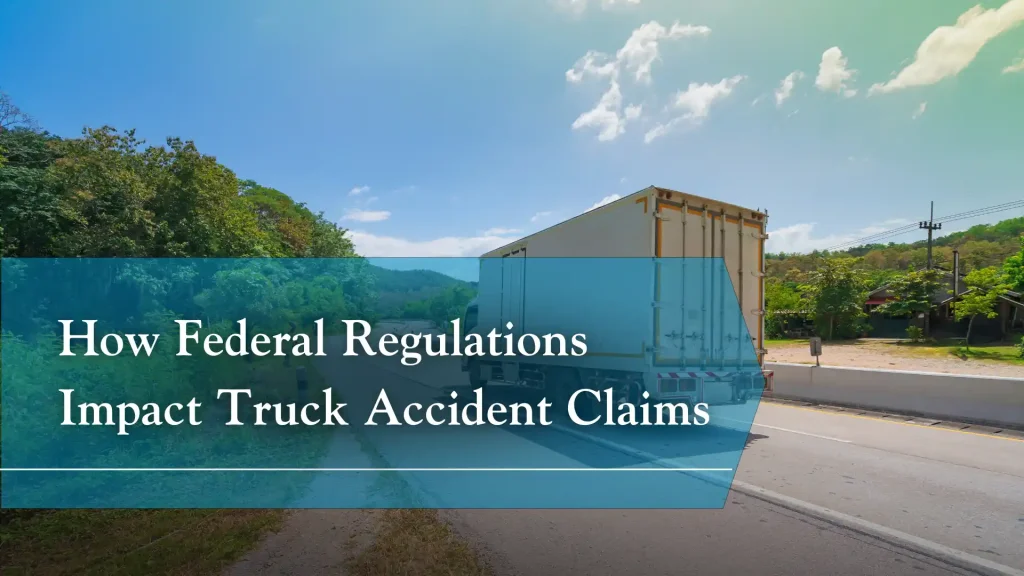Posted on Friday, August 1st, 2025 at 9:00 am

If you were in a truck accident in Washington, you may not realize the vital role federal trucking regulations may play in your legal case. Truck accident cases are often more complex than car accident cases, partly because of the federal rules that apply to truck drivers, trucking companies, and cargo loaders—regulations that can play a significant role in federal regulations truck accident claims and determining liability.
Understanding these regulations and how they could impact your case is crucial for maximizing compensation.
What Federal Regulations Apply to Truck Drivers and Companies?
Many federal regulations could apply to your truck accident case, depending on the circumstances of the crash. However, the four most common federal regulations are those regarding hours of service, cargo securement, drug and alcohol testing, and commercial vehicle size and weight.
Hours of Service Regulations
The Federal Motor Carrier Safety Administration (FMCSA) limits how much time commercial truck drivers can spend behind the wheel in one sitting and over extended periods. These hours of service regulations are in place to prevent truck drivers from becoming fatigued, which can lead to increased reaction times and a higher chance of falling asleep while driving. Some of the key hours of service regulations include:
- An 11-hour driving limit after 10 consecutive hours off duty
- Mandatory 30-minute breaks for every eight cumulative hours of driving
- A 60/70-hour on-duty limit in 7/8 consecutive days
Cargo Securement Regulations
The FMCSA also has regulations that cargo loaders must adhere to regarding cargo securement practices. These regulations detail the types of securement required for different materials, such as paper rolls, logs, and heavy machinery. They also need a certain number of tiedowns based on the weight of the material being transported—just one example of the role of federal regulations in truck accident cases and how safety violations can impact liability.
Drug and Alcohol Testing Requirements
The Omnibus Transportation Employee Testing Act requires employees in the transportation sector, including truck drivers, to undergo regular drug and alcohol testing. These regulations detail who must undergo testing, when, and how the tests must be conducted.
In a recent year, the National Highway Traffic Safety Administration (NHTSA) found that 12,429 fatalities were caused by drunk driving, highlighting the need for these testing requirements.
Size and Weight Regulations
While each state has its own size and weight regulations for commercial trucks, there are also federal regulations that trucking companies must abide by.
For example, the federal gross weight limit for vehicles operating on interstate highways is 80,000 pounds. Additionally, the federal vehicle width limit is 102 inches (8.5 feet). There is no federal limit for vehicle height or length. However, many states have limits of about 13.5 feet high and 60 feet long for semi-trucks.
How Federal Violations Affect Truck Accident Claims
One of the main ways federal violations affect truck accident claims is by contributing to the accident itself. A truck driver who violates the hours of service regulations may not react in time to a road hazard, causing a severe collision. Or a truck driver who drives while intoxicated may cross the center dividing line and collide with a passenger vehicle head-on.
Likewise, cargo loaders that don’t follow the proper cargo securement regulations could contribute to accidents. Unsecured cargo can shift in transit, causing a truck to roll over due to a weight imbalance. Or, the cargo could fall from the back of a flatbed trailer and collide with a following vehicle.
Even a truck’s size and weight can contribute to accidents. The heavier a truck is, the longer the distance it needs to come to a complete stop. Overloaded trucks are more likely to experience brake failures and cause rear-end accidents. And trucks that exceed dimension limits may collide with other vehicles when making sharp turns or collide with low bridges.
Please read more about accident claims here: Legal Action for False Car Accident Claims in Washington.
How to Strengthen a Claim Using Federal Regulation Breaches

Building a strong truck accident case often involves using breaches of federal regulations to your advantage. For example, your lawyer could obtain the truck driver’s logbook and identify that they had breached the hours of service regulations, which may explain why they rear-ended your vehicle.
Additionally, your lawyer may find a pattern of the trucking company encouraging its drivers to violate the hours of service regulations to make deliveries faster. This could open the trucking company up to liability, as well.
Contact Our Washington Truck Accident Lawyers
If you were in an accident involving a commercial motor vehicle in Washington, contact The Law Offices of Briggs & Briggs at (253) 588-6696 for a free consultation with an experienced truck accident lawyer in Washington. Our firm never charges a fee unless we secure compensation for you. You don’t have to worry about whether you can afford to seek financial recovery after a truck accident injury because we are here to help you.
Related Post
How Are Truck Accidents Different from Other Auto Accidents?
